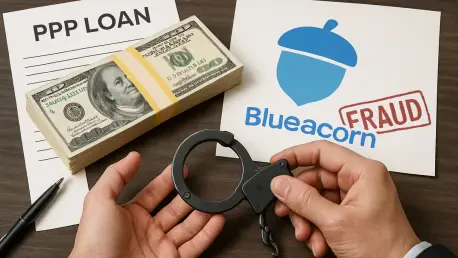Welcome to an insightful conversation with Priya Jaiswal, a distinguished expert in Banking, Business, and Finance, known for her sharp analysis of market trends and deep understanding of financial systems. Today, we dive into the high-profile case of Blueacorn, a fintech company embroiled in controversy over its misuse of COVID-19 relief funds through the Paycheck Protection Program (PPP). In this interview, Priya unpacks the intricate details of fraud, the impact on small businesses, and the broader implications for financial oversight during crises. We’ll explore the origins of Blueacorn, the specific fraudulent actions taken by its founders, the legal consequences they face, and the ripple effects on government programs designed to support struggling businesses.
Can you walk us through how Blueacorn came to be and what its stated mission was during the COVID-19 pandemic?
Certainly. Blueacorn was founded in April 2020, right at the onset of the COVID-19 crisis when businesses were grappling with unprecedented challenges. Its primary goal was to act as a bridge between small business owners and the Paycheck Protection Program (PPP) loans offered through the Small Business Administration. The idea was to help these businesses access critical financial relief to keep operations running and retain employees during lockdowns. On paper, it seemed like a noble mission—streamlining access to funds during a national emergency. But as we’ve seen, the execution took a much darker turn.
What can you tell us about the specific fraudulent activities Blueacorn engaged in with the PPP loans?
Blueacorn’s fraudulent activities centered on submitting false and misleading information in loan applications. They fabricated documents, including tax records and payroll figures, to make it appear that applicants qualified for funds they weren’t entitled to. This wasn’t just a minor oversight—it was a deliberate scheme to maximize payouts. By inflating numbers and falsifying data, they secured larger loans, which in turn meant higher fees for themselves since they charged borrowers a percentage of the funds received. It was a calculated exploitation of a program meant to help those in genuine need.
How did Blueacorn’s focus on high-dollar loans affect the broader landscape for small businesses seeking relief?
Their strategy had a significant impact. Blueacorn prioritized what they called ‘monster loans’—high-dollar applications that promised bigger fees—while often sidelining smaller loan requests from businesses that arguably needed the help most. This skewed the distribution of PPP funds, leaving many smaller, legitimate businesses struggling to access the support they were counting on. Reports indicate Blueacorn collected around $1 billion in fees from the PPP, which shows just how much they profited while distorting the program’s intent. It’s a stark example of how greed can undermine a system designed for public good.
Can you explain the legal consequences faced by the co-founders and what they might mean for their futures?
Nathan Reis, one of the co-founders, recently pleaded guilty to conspiracy to commit wire fraud, which involves agreeing to deceive others through electronic communications to gain money or property unlawfully. He’s scheduled for sentencing on November 21 and could face up to 20 years in prison. His wife and co-founder, Stephanie Hockridge, was also found guilty of the same conspiracy charge after a trial, though she was acquitted on several counts of wire fraud. While Reis’s guilty plea might signal cooperation or remorse, potentially influencing sentencing, the maximum penalty looms large. For Hockridge, the acquittals on some charges could mitigate her overall punishment, but the conspiracy conviction still carries serious weight. The court will likely consider factors like the scale of the fraud and any restitution efforts when deciding their fates.
What has been the government’s stance on this case, and why does it matter on a larger scale?
The Department of Justice has been very clear that this case is a priority, emphasizing their commitment to holding accountable those who exploit taxpayer-funded programs. They’ve described Blueacorn’s actions as a betrayal during a national emergency, with officials underscoring that stealing from public funds for personal gain won’t be tolerated. Beyond the individuals involved, the government also severed Blueacorn’s ability to work with the SBA after a damning congressional report in 2022. This case matters because it’s a signal to other fintechs and businesses that profiting off crisis relief through fraud will have severe repercussions. It’s also a wake-up call to strengthen oversight in emergency funding programs.
What is your forecast for the future of financial oversight in relief programs like the PPP after cases like Blueacorn?
I believe we’re at a turning point. Cases like Blueacorn expose the vulnerabilities in rapid-response relief programs, especially when funds are disbursed quickly with limited initial scrutiny to meet urgent needs. Going forward, I expect regulators to push for stricter vetting processes, enhanced digital tracking of applications, and harsher penalties for fraud. There’s also likely to be a greater emphasis on collaboration between government agencies and private sector partners to flag suspicious activity early. While speed is crucial in a crisis, balancing it with accountability will be the key challenge. We may see pilot programs for real-time fraud detection or even AI-driven audits becoming standard in future relief efforts to prevent repeats of such large-scale abuses.









